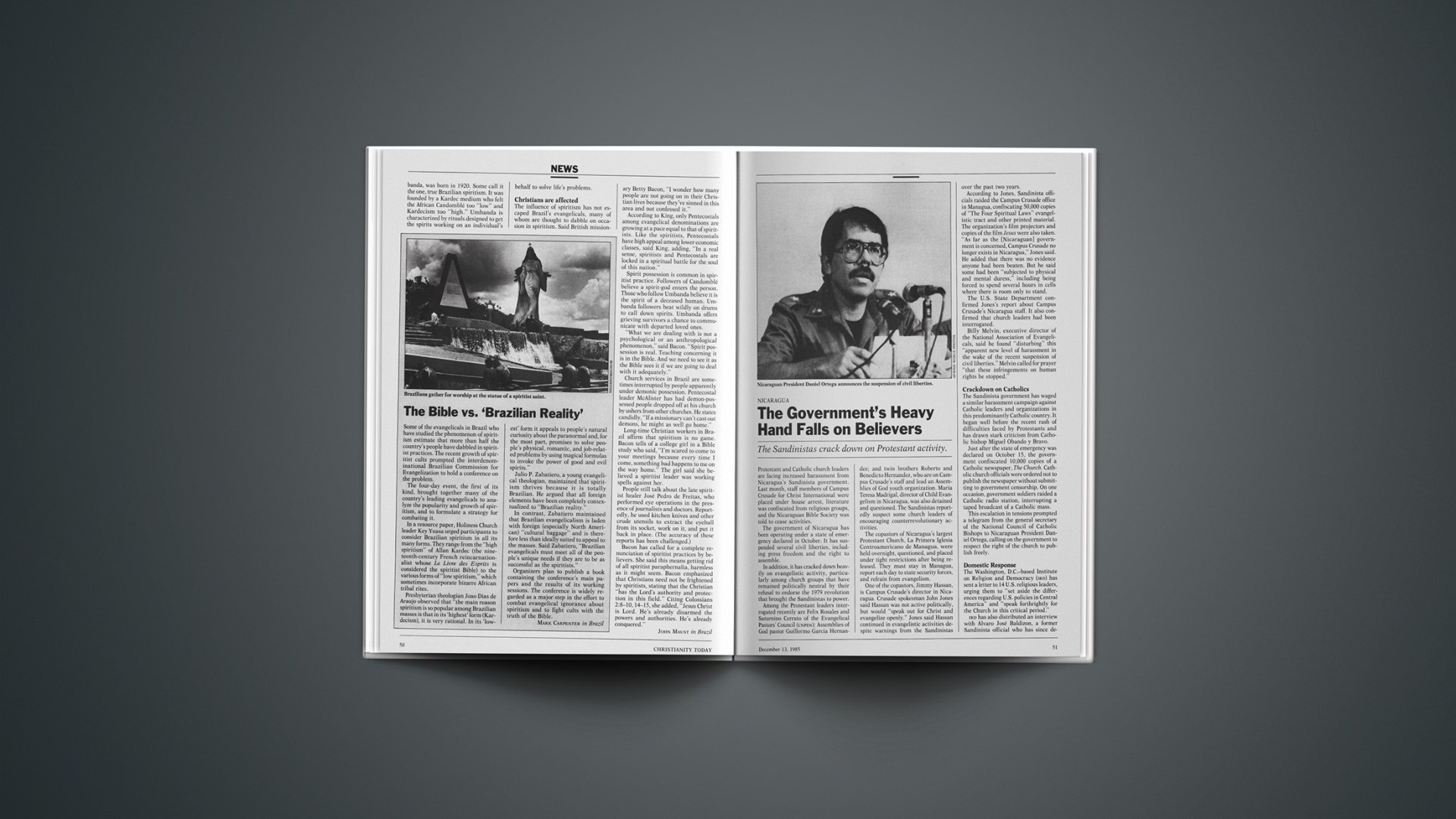The Sandinistas crack down on Protestant activity.
Protestant and Catholic church leaders are facing increased harassment from Nicaragua’s Sandinista government. Last month, staff members of Campus Crusade for Christ International were placed under house arrest, literature was confiscated from religious groups, and the Nicaraguan Bible Society was told to cease activities.
The government of Nicaragua has been operating under a state of emergency declared in October. It has suspended several civil liberties, including press freedom and the right to assemble.
In addition, it has cracked down heavily on evangelistic activity, particularly among church groups that have remained politically neutral by their refusal to endorse the 1979 revolution that brought the Sandinistas to power.
Among the Protestant leaders interrogated recently are Felix Rosales and Saturnino Cerrato of the Evangelical Pastors’ Council (CNPEN); Assemblies of God pastor Guillermo Garcia Hernandez; and twin brothers Roberto and Benedicto Hernandez, who are on Campus Crusade’s staff and lead an Assemblies of God youth organization. Maria Teresa Madrigal, director of Child Evangelism in Nicaragua, was also detained and questioned. The Sandinistas reportedly suspect some church leaders of encouraging counterrevolutionary activities.
The copastors of Nicaragua’s largest Protestant Church, La Primera Iglesia Centroamericano de Managua, were held overnight, questioned, and placed under tight restrictions after being released. They must stay in Managua, report each day to state security forces, and refrain from evangelism.
One of the copastors, Jimmy Hassan, is Campus Crusade’s director in Nicaragua. Crusade spokesman John Jones said Hassan was not active politically, but would “speak out for Christ and evangelize openly.” Jones said Hassan continued in evangelistic activities despite warnings from the Sandinistas over the past two years.
According to Jones, Sandinista officials raided the Campus Crusade office in Managua, confiscating 50,000 copies of “The Four Spiritual Laws” evangelistic tract and other printed material. The organization’s film projectors and copies of the film Jesus were also taken. “As far as the [Nicaraguan] government is concerned, Campus Crusade no longer exists in Nicaragua,” Jones said. He added that there was no evidence anyone had been beaten. But he said some had been “subjected to physical and mental duress,” including being forced to spend several hours in cells where there is room only to stand.
The U.S. State Department confirmed Jones’s report about Campus Crusade’s Nicaragua staff. It also confirmed that church leaders had been interrogated.
Billy Melvin, executive director of the National Association of Evangelicals, said he found “disturbing” this “apparent new level of harassment in the wake of the recent suspension of civil liberties.” Melvin called for prayer “that these infringements on human rights be stopped.”
Crackdown On Catholics
The Sandinista government has waged a similar harassment campaign against Catholic leaders and organizations in this predominantly Catholic country. It began well before the recent rash of difficulties faced by Protestants and has drawn stark criticism from Catholic bishop Miguel Obando y Bravo.
Just after the state of emergency was declared on October 15, the government confiscated 10,000 copies of a Catholic newspaper, The Church. Catholic church officials were ordered not to publish the newspaper without submitting to government censorship. On one occasion, government soldiers raided a Catholic radio station, interrupting a taped broadcast of a Catholic mass.
This escalation in tensions prompted a telegram from the general secretary of the National Council of Catholic Bishops to Nicaraguan President Daniel Ortega, calling on the government to respect the right of the church to publish freely.
Domestic Response
The Washington, D.C.-based Institute on Religion and Democracy (IRD) has sent a letter to 14 U.S. religious leaders, urging them to “set aside the differences regarding U.S. policies in Central America” and “speak forthrightly for the Church in this critical period.”
IRD has also distributed an interview with Alvaro José Baldizon, a former Sandinista official who has since defected. Baldizon claims he was assigned by Nicaraguan Interior Minister Tomas Borge to investigate reports of human rights abuses and then to help cover them up. He charges that the Sandinistas have killed thousands of citizens who did not support the government.
IRD maintains that such a charge “places a grave cloud of suspicion over the Sandinista government, which should be carefully investigated. Until it is disproven, it should cause all Christians and other persons of good will to suspend any further cooperation with the Sandinistas.”
When Baldizon visited Washington earlier this year, he was also interviewed by Eric Olson, editor of an Evangelicals for Social Action (ESA) newsletter on Nicaragua. Olson said he spent two hours with Baldizon, covering much of the territory covered by the IRD. The two organizations have opposing views on U.S. policy in Central America.
Olson said Baldizon’s point of view “should be taken seriously.” However, he expressed concern that IRD had not independently verified Baldizon’s statements. According to Olson, Baldizon had little firsthand knowledge of religious groups in Nicaragua and tended to make sweeping statements.
ESA Executive Director Bill Kallio said his organization opposes the Nicaraguan state of emergency and has called for “a quick end” to it. ESA has organized “Intercessors for Peace and Freedom,” a prayer network of Christians concerned about Central America.
Olson attended a public meeting with Nicaraguan President Daniel Ortega in New York, and found it dominated by representatives of revolutionary groups sympathetic to the Sandinistas. “I felt very uncomfortable,” Olson said, explaining that questions from the audience hinting at criticism of the Nicaraguan rulers were greeted with hisses and boos.
In New York, Ortega gave a 45-minute address and fielded questions about his country’s new “security measures.” Nicaragua blames the United States for disrupting that country’s economy and for supporting counterrevolutionaries (contras), who oppose the government.
The Reagan administration views the Sandinista government as a Marxist regime with close ties to Cuba and the Soviet Union. Despite Ortega’s meetings in New York and his efforts to shape U.S. public opinion, Christians in this country and in Nicaragua are more unwilling than ever to endorse rulers who systematically disrupt civil liberties.
BETH SPRING










